

|
Back to |
| The Front Page |
| News & Features |

|
The US leads the world in confirmed Corona Virus cases |
|
by Bob Alman photographs as attributed layout by Reuben Edwards posted on March 29, 2020
|
For most people, croquet is not a contact sport, but as a rational response to the unknown, most multi-day croquet events throughout the world have been canceled or postponed--including Tier 2 and Tier 3 of the Golf Croquet World Team Championship (until 2021). The organizers of regional and local events which haven't been canceled are coming under increasing pressure. And yet, responsible behavior is usually defined by following the rules, wherever they apply. As it happens, the United States has become the epicenter of the pandemic precisely because of the reluctance of "top management" to come to grips with what most people regard as scientific reality. It's a time when "common sense" doesn't really apply unless and until it's combined with the latest science, and there may be a consequence, after all, of not believing "fake news."
Even though the US got a late start, the official American Corona Virus count is bigger than in any other country and growing by the minute. But it's true that if cases aren't counted--as they aren't in much of the world--they don't officially exist. Perhaps that's why the disease doesn't officially exist in most of Africa.
In Latin America, the president of Brazil dismisses the virus as "something like a cold." When the governor of a Mexican state suggested in a speech that "poor people are immune" some of his supporters accused him of poetic eloquence by explaining that only the wealthy can afford to fly to infected regions--in this case by a plane charter to Colorado for skiing--and bring back to Mexico a deadly virus.
| Free special sites provide daily updates |
|
Britain's ECONOMIST and America's NEW YORK TIMES host special websites anyone may freely access for daily updates. Here are the bulletins from Saturday's New York Times update:
* U.S. cases surpass 100,000 [now more than 110,000] as Trump signs $2 trillion aid package into law.
* New York may fine people in parks and houses of worship to stem the outbreak.
* As deaths surge, Spain and Italy look for signs of a turning point.
* More experts say Americans should probably start wearing masks.
* Hong Kong and Singapore impose new restrictions as case numbers climb.
* The pope confronts the virus: ‘We find ourselves afraid.’
* Ireland enters a strict lockdown, and the U.K. checks its rule book.
|
The legendary John Prince, who says he has washed his car very thoroughly, had plenty of time to draw a cartoon for Croquet World, and top female player Jenny Clarke reports that she can no longer walk her dogs in the forest, because she would have to use her car to get there with their two dogs.
Prince reports, "We all have to stay home apart from solo supermarket visits, nothing has been an issue so far as ours is a small town of about 4,000. I’m to have a flu injection tomorrow, usual for over 70’s, which will be like a drive through, as they’ll do it in the medical centre carpark."
The US president has given the virus a nationality, calling it "the Chinese virus." But after weeks of hesitation and prevarication, he has activated a law not employed since the 30s enabling him to legally order General Motors to make ventilators.
Bob Alman, who in his eighty-first year is in the "at risk" category, bought a mask yesterday. It's uncomfortable, but he says he will wear it when he must go out for groceries--or to avoid going insane with boredom at home, even though he has had a bronchial condition that requires him to cough every now and then. At those moments, in public, he confronts the full experience of being a pariah, as people glance or stare at him with horror and scurry away. The sight of all those masks adds to the eeriness of the relative emptiness of the streets. Mainstream media predict that most people in the streets will soon be wearing the masks.
"Social distancing" attains the virtual status of law
Some form of "social distancing" is now the norm throughout much of the enlightened world. India and New Zealand could hardly be more dissimilar, but their enforcement levels are equally stringent, both limiting everyone to "stay at home" except for essentials, which must be proven.
Safety measures are spotty in the US, which does not have a uniform and universal code. The fact is that "responsible behavior" is not defined in California the same way it is defined in Florida and Louisiana, not even to mention New Zealand.

|
| One of Jenny Clarke's two dogs enjoys "dog heaven" with special attention in the Level Four lock-down phase. |
John Prince comments, "We all have to stay home apart from solo supermarket visits, nothing has been an issue so far as ours is a small town of about 4,000. I’m to have a flu injection tomorrow, usual for over 70’s, which will be like a drive through, as they’ll do it in the medical centre carpark."
Meanwhile, in Florida....
In the sunshine state, local jurisdictions, counties, and states set their own rules, take their own measures. And the president of the United States appears to favor some governors while penalizing others. As a consequence, in Florida all the state parks and the beaches have been closed, but in Palm Beach County one of the biggest county parks--Okeheelee--is open and welcoming (as of March 27.) Some of the staffed and organized activities there--such as solitary board surfing operated on a fascinating triangle of cables moving continuously--proceed Wednesday through Sunday, while the soccer field and tennis courts stand empty and the golf course has closed.
In Boca Raton, just down the road, the mayor has confined citizens to their homes. But in West Palm Beach, we can still go out--and we do. And in Palm Beach, oddly, Worth Avenue appeared no more deserted than in a typical May or June--although most of the stores are closed and empty of merchandise, several weeks before the official end of the season, at Easter.
Nevertheless the state has designated Palm Beach County an ORANGE ZONE, as counted cases soar in South Florida, perhaps as a consequence of "spring break" which over-populated the beaches, all of which are now closed by law.
Two trillion dollars should help in the US
| Critical shortage of ventilators hampers treatment in advanced countries |
|
According to The Economist, "British scientists reckon that 4.4% of those infected will need hospitalisation; about one in three of those requires treatment in an intensive-care unit (icu). Doctors in ICUs treat severe pneumonia, the hallmark of a serious case of covid-19, all the time. But with this new disease they do not yet know which changes in a patient’s symptoms, blood tests or vital signs are critical ones. Some may point to improvements, while others suggest deterioration and the need for more intensive care, such as a ventilator." These figures suggest than between one and two percent of patients will need a ventilator to survive--but that assumes sound medical care and the availability of ventilators.
|
Donald Trump has signed an unprecedented financial "rescue package" of two trillion dollars just passed by the American Congress, as the president continues to contradict himself and his advisers, deny personal responsibility, and command an end to the emergency "by Easter."
With the TESTED numbers tripling every three days in Manhattan, estimates of hospital beds needed before the end of April are up to 140,000 (as of March 26). President Trump said in response to New York Governor Cuomo's request for ventilators, "I don't feel that's necessary...." But later he relented and (as of this writing) has promised several thousand, while a protocol for two patients sharing ventilators is being worked out in America's main travel hub.
What the real toll is in Africa is unknown, as many of those countries are still concentrated on civil and religious wars of various kinds. And in the misery of mass migrations of Muslims towards Europe, tented on overcrowded small Greek islands, the virus hardly even registers as a serious concern in the scale of things.
We asked some of our friends around the world to share their photos of "social distancing" with us--along with some explanations of local responses.
It's likely we'll do another story on this, next month. In the meantime, here are some glimpses of life in various places, as experienced by some of our favorite croquet personalities, around the world.
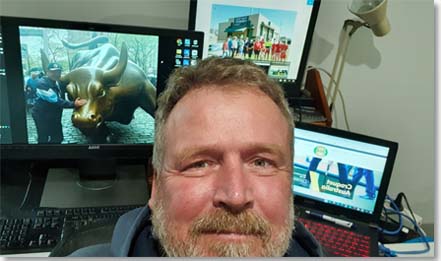
|
| In Australia, Jim Nichols is well prepared for his isolation, surrounded by cyberstuff. On Friday, he captioned, "I am just doing Day One of self-quarantine. I don't have covid-19, however best practice is to simply stay at home. Thankfully I am able to work from home. The local club is only allowing four persons per lawn, but quite frankly complete lockdown is the best way to 'flatten the curve'. |
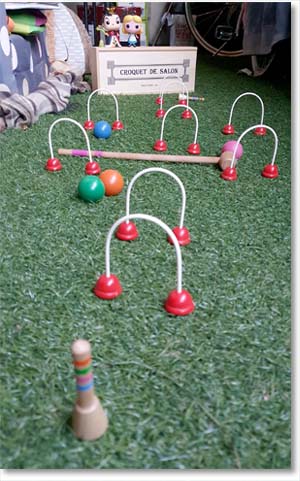
|
In Brisbane, Zach Kominar's balcony has been re-purposed as a "salon" for practicing some variants of our favorite sport. |
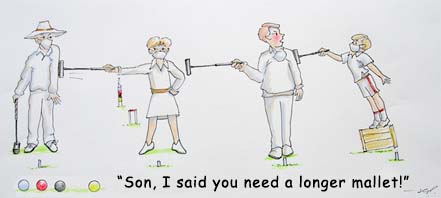
|
| John Prince wrote this caption for "A New Zealand Croquet family at Level 4, including Granddad, practising social distancing on their croquet lawn as they await the return to Level 3." |
| Near Christchurch, a walk in the local forest with the dogs is now out of bounds for Jenny Clarke, because with Level Four restrictions, driving is allowed only for essential needs. She comments in the mid-week, "The wee fantail (Maori name: Piwakawaka) buzzed us for a while and then wanted to join in the walk..." | 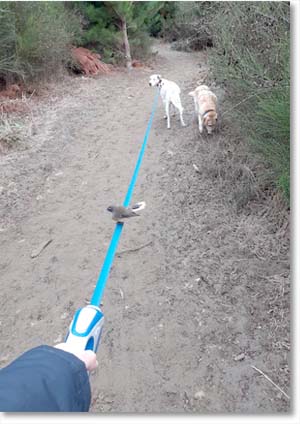
|
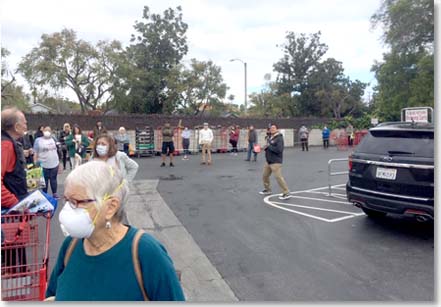
|
| The picture was taken by Rhys Thomas in the parking lot of the Sherman Oaks Trader Joe's at 9:05 am on Thursday morning. What you see is just part of the line to get in the store, which opened at nine. The line stretched out of the parking lot and down the block, probably a good hundred yards or more. I took the picture from near the end of the shorter "Seniors" line, which is given preferential entry between nine and ten. I arrived at 8:45 am, shopped for 20 minutes and was home by 9:45. The seniors were largely un-masked and standing closer to each other than the younger folks in line. In particular, the most heavily masked in the lines were Millennials, who were also giving each other wide berths. I'm not sure what the message is there but I suspect it has something to do with "fear" and "fear not." I do not wear a mask but I keep a good distance from others. I'm also an inveterate hand-washer--always have been. The other side note has to do with those who are out and about. Drivers are typically in a rush in LA, but now everyone is speeding, running stop signs and occasionally red lights. It's as if people think they can outrun the bug. I'm also amused (slightly, though also disturbed) by the number of people buying guns, as if they can shoot the bug! Perhaps it's to defend their stockpiles of TP to the death! |
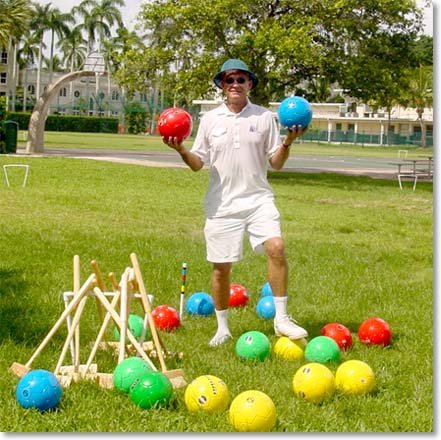
|
This photo is from a number of years ago, when Bob was doing regular SuperSize Croquet events in public settings--this one for a middle school in Palm Beach. Just a week ago, Bob was planning a SuperSize Croquet event for mixed doubles in a sparsely populated section of Okeheelee Park which would demonstrate a safety protocol that included:
|
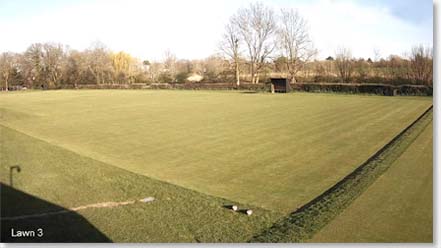
|
| A law-abiding Dr. Ian Plummer documents the ease of being a recluse in England by photographing the action on Surbiton's Lawn Three. Specifically, the Prime Minister's orders forbids gatherings in "enclosed spaces in parks, including playgrounds, sports courts and pitches, and outdoor gyms or similar." |
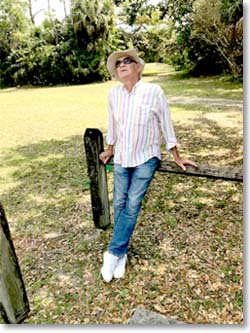
|
Bob Alman, in a corner of Palm Beach County's vast Okeheelee Park on March 24, imagines directing a "safe" event which has quickly has become unthinkable. Bob van Tassel photo. |
The editor of this magazine tries to make up for the shocking paucity of journalism in the croquet world by maintaining this magazine, now owned by the Croquet Foundation of America. In his 81st year on the planet, he wishes to turn over the editorial responsibility for maintaining it to a younger journalist, who will be supported partly by a grant and a continuing stream of income from family oil royalties and eventually, from the entire (though surprisingly modest) Bob Alman estate.